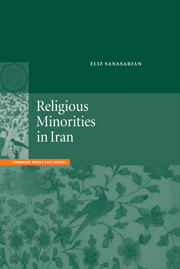Book contents
- Frontmatter
- Contents
- List of illustrations
- List of tables
- Preface
- Acknowledgments
- Notes on transliteration and bibliography
- Glossary
- Introduction: an overview of politics and society
- 1 Ethnic anatomy and politics of non-Muslim minorities
- 2 The Assembly of Experts: debut in the year of destiny
- 3 Policy sphere of recognized religious minorities
- 4 Distinctions and designations as policy output
- 5 Prevalent responses of recognized religious minorities
- Conclusion: the perils of marginality
- Notes
- Bibliography
- Index
- Titles in Series
Introduction: an overview of politics and society
Published online by Cambridge University Press: 22 September 2009
- Frontmatter
- Contents
- List of illustrations
- List of tables
- Preface
- Acknowledgments
- Notes on transliteration and bibliography
- Glossary
- Introduction: an overview of politics and society
- 1 Ethnic anatomy and politics of non-Muslim minorities
- 2 The Assembly of Experts: debut in the year of destiny
- 3 Policy sphere of recognized religious minorities
- 4 Distinctions and designations as policy output
- 5 Prevalent responses of recognized religious minorities
- Conclusion: the perils of marginality
- Notes
- Bibliography
- Index
- Titles in Series
Summary
Iranian modern history has exhibited constant fluctuation between extremes. Nationalism has turned into an intense anti-other diatribe and religious devotion has moved to bigotry. This study focuses on the relationship between the state and non-Muslim religious minorities (Armenians, Assyrians, Bahais, Chaldeans, Iranian Christian converts, Jews, and Zoroastrians) in order to explore the dynamics of this extremism and its impact. How far could an ideological state go in implementation? What form has this dogmatic impulse taken and to what end? And what has been the response of religious minorities?
This chapter explains the conceptual framework of the study, provides an introductory survey of Iranian politics in the twentieth century, offers a brief synopsis on the role of non-Muslims in Islam, presents the views of the non-Muslims held by the Shii revolutionary ideologues, and, finally, identifies several important issues in this research.
The study of ethnic groups (when relevant called minorities) reveals much theoretical unevenness. Researchers often entertain differing assumptions and conclusions. Case studies offer the most useful and elaborate frameworks, but they rarely seem to apply to other situations. And, as always, the nature of the case study has a direct bearing on its theoretical conclusions. Various dimensions of ethnicity appear too complicated and, at times, simply incomprehensible. Too many terminologies are used, frequently becoming mixed in an interlocking web of individual and disciplinary preferences. Yet this extensive literature remains intensely thought-provoking.
Defining groups
Most scholars have made a genuine attempt to be all-inclusive in identifying ethnic groups.
- Type
- Chapter
- Information
- Religious Minorities in Iran , pp. 1 - 33Publisher: Cambridge University PressPrint publication year: 2000



